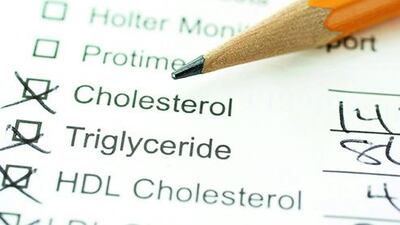Making sure you know these numbers will help keep your heart health in check. Just remember that the below figures apply to the average adult; you should always consult your doctor for the most accurate information that applies to you.
Blood Pressure: <140/<90 mm Hg
Simply put, blood pressure is the measurement of the force of blood as it pushes against blood vessel walls as the heart pumps it around the body. Blood pressure is recorded as two numbers: the first number, known as systolic pressure, measures artery pressure when the heart is contracted; the second number, diastolic pressure, measures it when the heart is relaxed. Normal blood pressure is around 120/80 mmHg, though it may be lower for some. It is recommended that you get your blood pressure checked at least once a year.
Total Cholesterol: 100-199 mg/dL
Some factors that increase the risk of developing heart disease, such as cholesterol levels, have no symptoms. For this reason, it is vital to keep track of your cholesterol levels in order to maintain a healthy heart and reduce the risk of developing plaque on artery walls leading to heart-related issues. It is important to keep in mind that there is good cholesterol, HDL, and bad cholesterol, LDL. Current guidelines aim for combined cholesterol levels at around 100-199 mg/dL, all the while keeping HDL levels high (above 45 mg/dL) and LDL levels low (below 130 mg/dL), a combination which decreases the risk of developing heart disease. It is recommended that all individuals aged 20 and older, get their cholesterol levels checked every five years.
Exercise: 30 minutes, 5 days a week
It’s not news that exercise is a great way to maintain a healthy body and heart. However, to receive the full benefits of exercising, regularity is key: exercising for 30 minutes a day, five times a week can improve your heart health, and reduce the risk of developing heart disease as well as improving overall well-being. To benefit most while ensuring safety, exercises like aerobics, swimming and walking are recommended. Older adults and patients with health issues are advised to consult their physician prior to starting an exercise program.
Blood Sugar: <100 mg/dL
In basic terms, blood sugar is the body’s fuel, providing you with energy to perform your daily normal activities, and insulin is needed to allow blood sugar to enter the cells and be used as energy. However, too much sugar in the blood can be unhealthy, leading to diabetes as well as an increased risk of developing heart disease. In fact, 19 per cent of the UAE’s residents live with diabetes. Blood sugar levels vary widely, however, it is generally recommended to maintain a fasting sugar level less than 100mg/dl. Diabetes is diagnosed by any one of the following: Two consecutive fasting blood glucose tests that are equal to or greater than 126 mg/dL, any random blood glucose that is greater than 200 mg/dL, a two-hour oral glucose tolerance test with any value over 200 mg/dL and levels of HbA1c that are equal to or greater than 6.5 per cent (HbA1c is an easy blood test that gives a three-month average of blood sugars).
BMI: 18.5-24.9
Obesity is a strong risk factor associated with heart disease, and 66 per cent of men, as well as 60 per cent of women in the UAE, are already overweight or obese. The body mass index is one way to measure obesity by finding the ratio of weight to height. A BMI measuring between 18.5 and 24.9 is considered normal or healthy, whereas anything less or above that range can indicate a problem.
* Antonio Sorgente, staff physician, Heart & Vascular Institute, Cleveland Clinic Abu Dhabi.





